Displaying items by tag: joomla
SEO Smart Check-Up
SEO Smart Check-Up is a professional SEO optimization service for your Joomla website offered at an amazing price.
The package includes the following checks:
- Joomla CMS upgrade (must be authorized before to proceed);
- Cache optimization;
- SEF URLs activation and optimization (must be authorized before to proceed);
- Server response tuning (keepalive, compression, headers);
- Fixes of site's broken links (up to 20 broken links, a report will be generated if more are found);
- Image compression (up to 20 images, a report will be generated if more are found);
- Content meta info optimization (title, description and keywords, up to 40 articles)
- Yahoo Overall Grade and Google Speed Score optimization.
How it works:
To optimize site configuration and content, you must grant a temporary backend access and the support for access to files (or just provide also a temporary FTP / SFTP access).
Price is only 75 euro. To request the service, login to Client Manager, create a new "Project Request" and provide required information.
Auto Group
Auto Group plugin for Community Builder 2.x / 1.x for Joomla 3.x and Joomla 2.5 allows to assign Joomla groups to an user depending on the value of a CB field. The check on the field's value is performed when the user register on site for the first time, and everytime the user profile is modified from the frontend or the backend. This allows, as example, to enable multiple user profiles, using Joomla groups as profile type, and CB fields to let users choose their profile type.
Usage example
Let's assume we need two different user profile types, Downloader and Uploader. We can create two different Joomla groups with the same name.
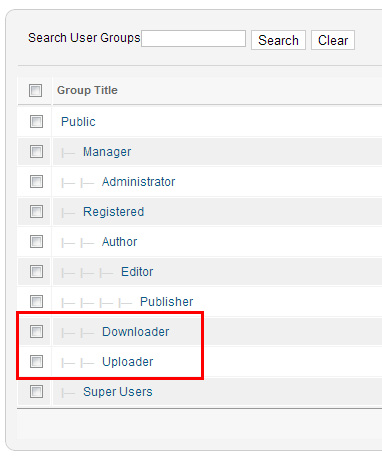
And use Joomla Access Levels to grant different permissions for each profile (e.g. grant permissions to upload files only for Uploader profile). Now we need to let an user to choose his profile type. Let's create a CB field named "cb_profiletype" of type "select", with three values, Downloader, Uploader and Both.

Once this field is published, the user will be able to choose the profile type in the registration form using this field.
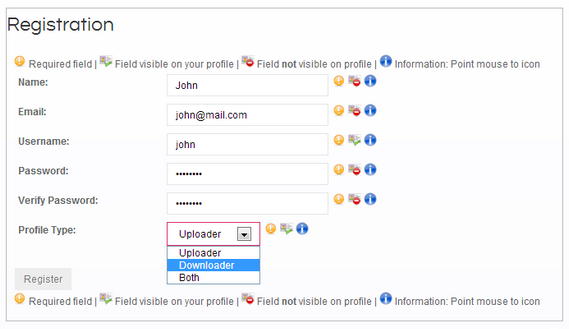
To assign the user to the corresponding Joomla group depending on the value for this field, let's enable Auto Group plugin from Community Builder panel and just configure a few rules (a rule for each line). Rule syntax is:
fieldname;fieldvalue, ... ,fieldvalue;groupname, ... ,groupname;unassign
Where "fieldname" is the CB field name to check (cb_profiletype in our example), "fieldvalue" is the field value that "trigger" the group assign action, and "groupname" is the Joomla group name to assign the user to. It's possible to specify a list of values and groups separated by a comma. Last field "unassign" can be only true or false (the default when not specified). When this is set to "true" this means that the groups specified should also be "unassigned" if the field value is different from the specified one (a group is unassigned only if is not explicitly assigned by another matching rule on a field).
Field types supported by Auto Group are:
- Check Box (Single)
- Check Box (Multiple)
- Drop Down (Single Select)
- Drop Down (Multi-select)
- Text Area
- Text Field
- Radio Buttons
For Check Box (Single) the field values for the plugin settings are 0 when unchecked and 1 when checked.
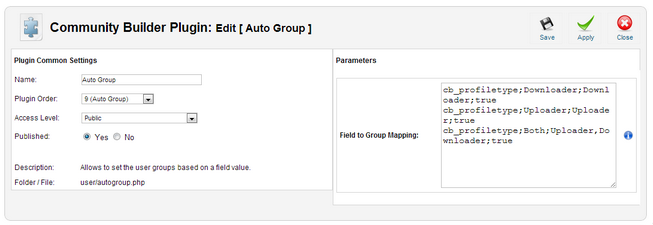
In our example rules are:
cb_profiletype;Downloader;Downloader;true
cb_profiletype;Uploader;Uploader;true
cb_profiletype;Both;Uploader,Downloader;true
With these rules any time the field "cb_profiletype" assume the "Downloader" value, the user is assigned to "Downloader" group, and unassigned from this group if the value is different (from Downloader and Both). Likewise, any time this field assume the "Uploader" value, the user is assigned to "Uploader" group, and unassigned from this group if the value is different (from Uploader and Both). Finally, if the field assume the "Both" value, the user is assigned to both "Uploader" and "Downloader" groups. Simple, effective and cheap. The price for the lifetime subscription is only 5€.
Auto Group is released under GPL 2.0 license.
CSLookup
CSLookup is a native Joomla plugin created for dynamically add a couple of drop down select list fields on any page and form for Country/State lookup. The Country list is automatically populated on page load, and when a user selects a Country from the dropdown list, the corresponding State dropdown list field will be automatically populated with the Country specific States. This can be used, as example, with JomSocial or Community Builder to add the Country/State lookup feature to the user profile form.
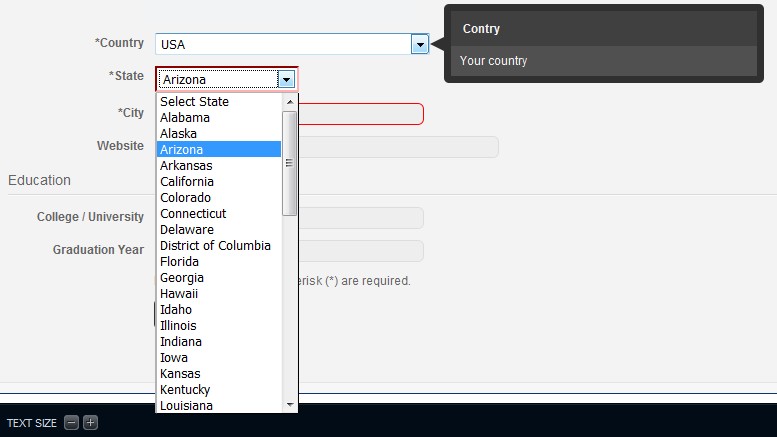
Usage is really simple! Just install the plugin from the Joomla! backend, enable it, and set the pages where you want to replace the Country and/or the State fields. The plugin can work on any form, it's sufficient that Country and State fields are "select" or "input" type (the select field can be initially empty), and have the HTML "id" attribute set. And this is not all!. If these fields have an initial value set, this value is automatically selected in the list created.
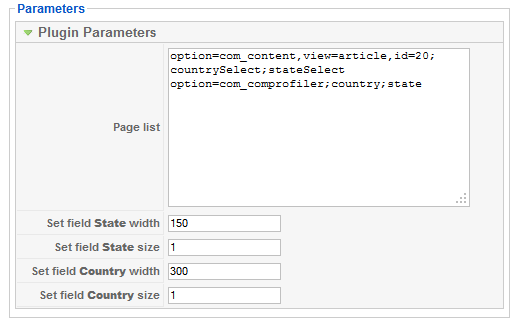
In the plugin settings there's a Page list text area, were each row can specify a page were replace the lookup fields. Each row MUST have the format parameters;countryid;stateid, where the parameters list MUST be in the format param1=value1,param2=value2,... (so a row example is option=com_community, view=register, task=registerProfile; field11; field9). If all parameters match, the lookup fields are created on the corresponding page, assuming that the select or input field with id "countryid" is the Country list, and the select or input field with id "stateid" is the State list. The plugin also support only the Country list, if the "stateid" is not specified.
Here is an example of how it works. In the form below, the Country and State fields are initially created with only one selected option using the following HTML code:
<form>
<table border="0">
<tbody>
<tr>
<td><select id="countrySelect" name="country"><option value="USA" selected="selected">USA</option></select></td>
<td><select id="stateSelect" name="state"><option value="Colorado" selected="selected">Colorado</option></select></td>
</tr>
</tbody>
</table>
</form>
And the plugin is configured to replace them on this page. Note that the initial values "USA" and "Colorado" are automatically selected.
CSLookup is released under GPL 2.0 license, and is available for download here.
Tag Meta
Tag Meta is a native extension (component + plugin) available for Joomla that allows to efficiently manage all site's meta information. With Tag Meta, as example, it is possible to set the tag 'title' or the meta tags (e.g. from the most common 'description', 'keywords', 'author', 'robots', as well as the recently 'content rights' and 'external reference') or link 'canonical' on any page, just specifying the URL or a part of it. This provides a swiss army knife to improve site positioning in SEO optimization. But Tag Meta also supports regular expressions in the matching rules and this allows to match a group of URLs with a single rule. In this way it is possible to manage all metadata from a single control panel.
Multiple rules can be applied together, so if more than a single rule matches with the current URL, these are applied in cascade using the ordering set, except if a rule is declared as ‘last one’ (in this case the process stop).
And that’s not all. Tag Meta comes with support for macros. This means that meta information can be generated dynamically for each page (e.g. there's a fantastic 'autokeywords' and ‘autokeywords2’ macro - Enterprise version only - that allow to extract automatically the most relevant words from a page content).
To allow complex transformations for data to use as meta info there are the placeholders. Placeholders allow you to define a set of values where each value is associated and identified by a name and is used in the definition of other placeholders or in the definition of meta info (practically they are based on the same principle of the variables in programming languages).
The plugin, finally, has some useful options to set custom global information like Generator, Author, Copyright, or to set and align the tag ‘title’ and the meta tag ‘title’ in many ways.
There are two versions of Tag Meta, Community and Enterprise, both released under GPL license. The Community version is completely free, while the Enterprise version has a little subscription fee, but introduces some advanced features. Here's a comparison matrix between Community version and Enterprise version:
| Features | Tag Meta Community | Tag Meta Enterprise |
|---|---|---|
| Support for tag 'title' and meta tag 'description', 'author', 'keywords', 'robots', 'content rights', and 'external reference' on each page |  |
 |
| Support for Robots options Index, Follow, Snippet, Archive, Odp, and Image Index |  |
 |
| Support for link 'canonical' |  |
 |
| Support for global meta tag 'generator' |  |
 |
| Possibility to add site name to tag 'title' |  |
 |
| Possibility to align meta tag 'title' with tag 'title' |  |
 |
| Possibility to preserve tag 'title' on each rule from global settings |  |
 |
| Support for global meta tag 'author' |  |
 |
| Support for global meta tag 'copyright' |  |
 |
| Possibility to add a note for each item |  |
 |
| Possibility to apply multiple matching rules |  |
 |
| Use of regular expressions into matching rules |  |
 |
| Case-sensitive option on the matching source URLs |  |
 |
| Request only option to match the full URL or just the REQUEST_URI part |  |
 |
| Decode URL option to decode URLs before to check if match with rule |  |
 |
| Last rule option to break application of matching rule |  |
 |
| Support for placeholders |  |
 |
| Use of macros to specify meta info (dynamic meta info) |  (46 macros) |
 (62 macros) |
| Macro {querydrop} to remove specified variables from the original query |  |
 |
| Macro {querydropfull} to remove specified variables from the original full query |  |
 |
| Macro {pathfrombaseltrim} to cut on left the path without the base part |  |
 |
| Macro {pathfrombasertrim} to cut on right the path without the base part |  |
 |
| Macro {preg_match} for apply regular expressions to full URL |  |
 |
| Macro {preg_select} for apply regular expressions to full URL and use result to query database |  |
 |
| Macro {autokeywords M,N} for automatic generation of keywords |  |
 |
| Macro {autokeywords2 M,N} for automatic generation of two-words keywords |  |
 |
| Macro {autosentence M,N} for automatic generation of sentences |  |
 |
| Macro {synonyms} for automatic generation of synonyms based on the ontology database |  |
 |
| Macro {nodevalue attrname,attrvalue} for extraction of any content from the document DOM |  |
 |
| Ontology database for synonyms with automatic generation of new synonyms from existing keywords |  |
 |
| Trace items usage with hits counter and info about last visit |  |
 |
| Trace synonyms usage with hits counter and info about last visit |  |
 |
| Configurable list of keywords to exclude from auto keywords generation |  |
 |
| Possibility to remove duplicated entries from keywords |  |
 |
| Possibility to remove the 'canonical' link if the page corresponds to the link itself |  |
 |
| Possibility to remove duplicated entries of 'canonical' link |  |
 |
| Possibility to set to a global base path for web site |  |
 |
| Safe UTF-8 word count function, for old PCRE versions without UTF-8 support |  |
 |
| REDIRECT mode, to support URL rewrite (e.g. sh404SEF) with Apache and IIS |  |
 |
| License | GPL 2.0 | GPL 2.0 |
| Price | Free | 9 € |
 |
 |
ReDJ
ReDJ is a native extension (component + plugin) available for Joomla that allow to manage URL redirections. This is very useful for creating URL aliases, and managing redirections from an old URL to a new one. A very similar extension has been added into Joomla since 1.6 version (Redirect component), but ReDJ supports powerful regular expressions that allow to match more than one source URL. In this way it is possible to create a group of redirections with just one ReDJ item. It's so easy.
Also, now ReDJ comes with support for macros into destination URL. This means that from now the destination URL can be dynamic.
Finally, an "internal redirect" feature has been added (Enterprise version only). With these features now is possible to create "real" URL alias with Joomla.
There are two versions of ReDJ, Community and Enterprise, both released under GPL license. The Community version is completely free, while the Enterprise version has a little subscription fee, but introduces some advanced features. Here's a comparison matrix between Community version and Enterprise version:
| Features | ReDJ Community | ReDJ Enterprise |
|---|---|---|
| Intercept and redirect any error 404 URL |  |
 |
| Support for 301 (Moved Permanently) |  |
 |
| Support for 307 (Temporary Redirect) |  |
 |
| Support for 200 (Internal Redirect) |  |
 |
| Use of regular expressions to specify matching source URLs |  |
 |
| Case-sensitive option on the matching source URLs |  |
 |
| Request only option to match the full URL or just the REQUEST_URI part |  |
 |
| Decode URL option to decode URLs before to check if match with rule |  |
 |
| Support for skip rule condition |  |
 |
| Support for skip usergroup condition |  |
 |
| Support for placeholders |  |
 |
| Option to apply a rule only in case of error |  |
 |
| Possibility to add a note for each item |  |
 |
| Use of macros to specify destination URL (dynamic destination URLs) |  (42 macros) |
 (54 macros) |
| Custom error page |  |
 |
| Use of macros to customize error page |  (6 macros) |
 (6 macros) |
| Trace redirections with hits counter and info about last visit |  |
 |
| Trace custom error page with hits counter and info about last visit |  |
 |
| Trace errors with hits counter and info about last referer and time |  |
 |
| Trace referers for each visited URL with hits counter and info about last visit |  |
 |
| Configurable list of referers to exclude from trace with macro support |  (2 macros) |
 (2 macros) |
| Option to redirect any error 404 URL to a custom page |  |
 |
| Option to shortcut extensions directly on the error page |  |
 |
| Option to set a global base path (easy items portability) |  |
 |
| License | GPL 2.0 | GPL 2.0 |
| Price | Free | 9 € |
 |
 |
